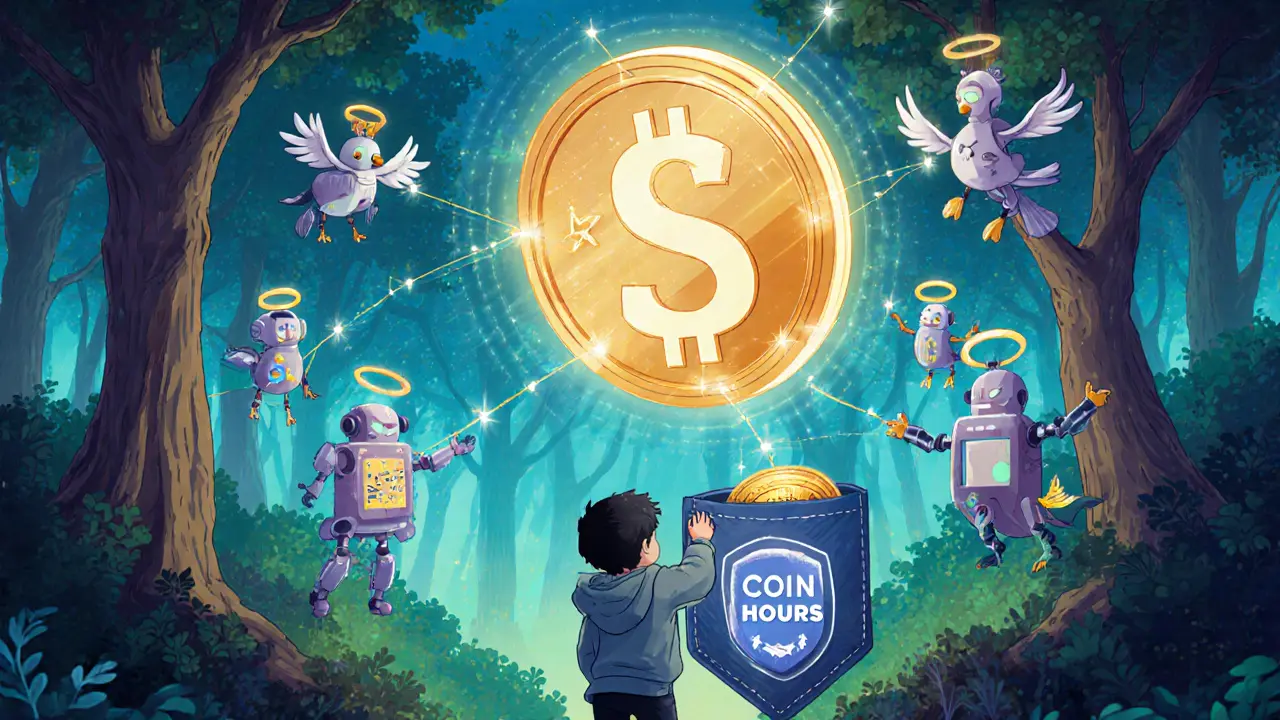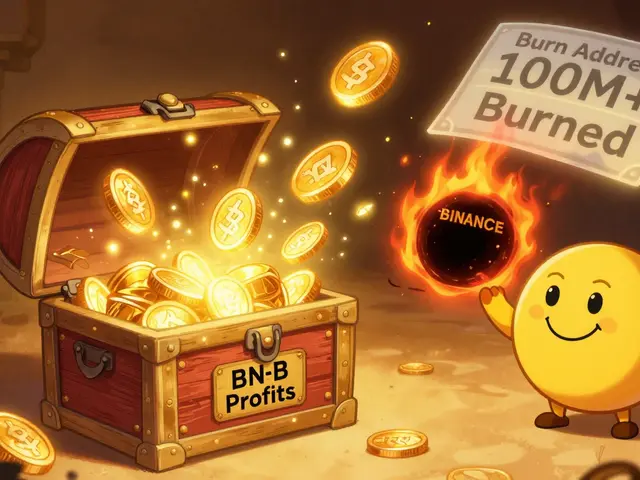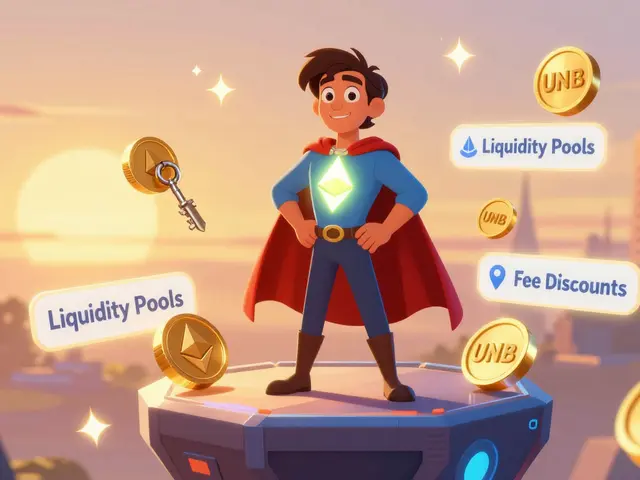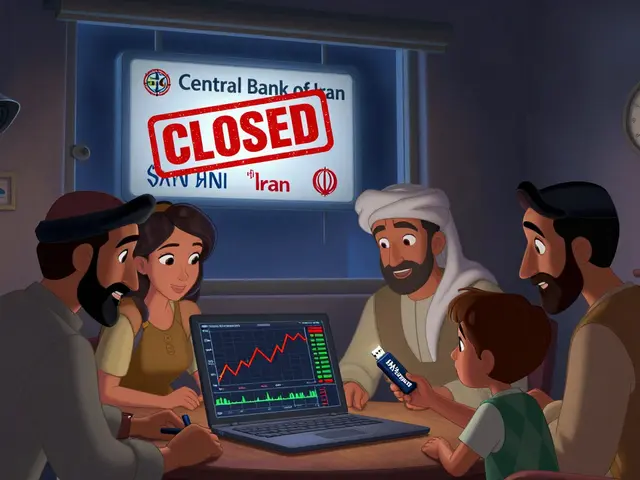Skycoin Coin Hours Calculator
How Coin Hours Work
Skycoin uses a unique "Coin Hours" system where every SKY coin you hold earns 1 Coin Hour per hour. Unlike transaction fees, these are built into the protocol to prevent spam and encourage holding.
1 SKY = 1 Coin Hour per hour
24 hours = 24 Coin Hours
10 SKY for 30 days = 7,200 Coin Hours
Your Coin Hours
Most people know Bitcoin as the first cryptocurrency. Ethereum added smart contracts. But what if the whole idea of blockchain needed a complete rebuild - not just an upgrade? That’s where Skycoin comes in. Skycoin (SKY) isn’t a fork of Bitcoin. It’s not a copy of Ethereum. It was built from the ground up by early Bitcoin developers who believed the original design had too many flaws to ever become a true peer-to-peer internet currency. And after over a decade of development, it’s still one of the most unusual projects in crypto.
What Makes Skycoin Different From Bitcoin?
Skycoin doesn’t use mining. No ASICs. No massive power plants running 24/7. Instead of proof-of-work, it uses something called the Obelisk consensus algorithm. Think of it like a social network for nodes. Each node builds trust with others over time. Transactions get verified not by who has the most computing power, but by who has the most reputation. This means no energy waste - Skycoin uses 99.98% less electricity per transaction than Bitcoin. One SKY transaction consumes just 0.0002 kWh. Bitcoin? Around 950 kWh. That’s the difference between a lightbulb and a power plant. Another big change: no transaction malleability. Bitcoin had this flaw for years until SegWit fixed it in 2017. Skycoin never had it. From day one, every transaction was designed to be immutable and predictable. No weird edge cases. No broken wallets because of a signed transaction changing its ID. Skycoin also removed the Turing-complete scripting language. Bitcoin and Ethereum let you write complex programs on their blockchains. Skycoin doesn’t. It’s built for one thing: fast, secure, feeless value transfer. That’s it. No smart contracts. No DeFi apps. No NFTs. If you want to build a dApp, you use a separate layer called CX, which runs on top of Skycoin’s network.Coin Hours: The Hidden Token Inside SKY
Here’s where Skycoin gets really strange - and clever. Every SKY coin you hold earns something called Coin Hours. One SKY = 1 Coin Hour per hour. So if you hold 10 SKY for 24 hours, you get 240 Coin Hours. These aren’t a separate coin. They’re a usage credit. To send a transaction, you spend Coin Hours, not SKY. This creates a built-in incentive to hold SKY - you’re not just storing value, you’re earning the right to use the network. It’s similar to how NEO’s GAS works, but with a twist. Coin Hours don’t expire. They stack up. You can save them for months. And because transactions are free (no miner fees), the network stays usable even when the price of SKY is low. This also makes spam attacks nearly impossible - you’d need to hold massive amounts of SKY to flood the network with transactions, and that’s expensive.The Fiber Network: Skycoin’s Real Goal
Skycoin isn’t just a currency. It’s the foundation for something bigger: Fiber. Fiber is a decentralized internet layer. Imagine replacing your ISP with a peer-to-peer network where anyone with a router, a spare computer, or even a smartphone can become a node. You get paid in SKY for sharing bandwidth and storage. This isn’t theoretical. The Skywire hardware project lets you plug a small device into your home network and start contributing. In return, you earn SKY tokens. The idea? Build a censorship-resistant internet that can’t be shut down by governments or corporations. Unlike Helium (which focuses on wireless hotspots) or Filecoin (which focuses on storage), Fiber tries to do it all - routing, storage, and compute - in one system. It’s ambitious. And so far, it’s mostly used by developers and crypto enthusiasts. But the vision is clear: if you can build a decentralized internet on top of a fast, feeless, energy-efficient blockchain, you don’t need Amazon, Google, or Cloudflare anymore.
Performance: Fast, But Not Perfect
Skycoin’s blockchain processes transactions in under 2 seconds. That’s faster than Visa’s average settlement time. Block times are 10 seconds. Throughput? Up to 300 transactions per second. Compare that to Bitcoin’s 7 TPS or Ethereum’s 15-30 TPS before upgrades. In theory, Skycoin should handle global payments without lag. But real-world performance has had hiccups. In April 2022, network traffic spiked and caused a 17-hour delay. The team patched it quickly, but it showed a vulnerability: the system isn’t yet stress-tested at scale. Most nodes are still run by the Skycoin Foundation. As of early 2022, 67% of verifying nodes were controlled by the core team. That’s a centralization risk. The community is working to fix it, but adoption is slow.Where Can You Use Skycoin?
Short answer: not many places. You won’t find SKY at your local coffee shop. According to Coinmap.org, only 0.0003% of merchants accepting crypto take Skycoin. That’s roughly 15 businesses worldwide. No major exchange lists SKY for direct fiat pairs - only 3 exchanges let you buy SKY with USD or EUR. Most trading happens on smaller platforms like Hotbit, Bitforex, and LBank. The real users? Developers. Crypto researchers. People who care about decentralization more than price. Reddit’s r/Skycoin has 12,500 members. Most posts are about node setup, network updates, or troubleshooting wallet issues. Trustpilot gives Skycoin a 4.2/5 rating - not because it’s easy to use, but because the community is responsive. If you’re stuck, you’ll get help on Telegram within a couple of hours.Wallets, Security, and Learning Curve
Skycoin doesn’t use standard BIP39 seed phrases. That means your recovery phrase won’t work in MetaMask or Trust Wallet. You need the official Skywallet app (iOS, Android) or desktop client (Windows, macOS, Linux). Setting up a wallet takes about 30 minutes for beginners. Syncing a full node? Around 3.2 hours on average. That’s long, but it’s because you’re downloading the entire Fiber network data, not just blockchain history. Security is strong. All transactions use mandatory CoinJoin, so no one can trace who sent what. Wallets are deterministic, with built-in hash collision checks. But there’s no safety net. If you lose your seed phrase, your SKY is gone. No customer service can recover it. And if you try to withdraw from an exchange that doesn’t support the memo field (a common error), your coins can vanish. Users report losing SKY this way. Always double-check withdrawal details.
Who’s Behind Skycoin?
The team is anonymous. The founder, known only as Synth, was an early Bitcoin Core contributor between 2010 and 2012. He left Bitcoin because he believed it couldn’t be fixed. He didn’t want to work on patches. He wanted to build something new. The rest of the team includes other early blockchain developers who left Ethereum and other projects for similar reasons. They don’t do interviews. No roadshows. No influencer marketing. Just code on GitHub. The project has 142 active contributors - tiny compared to Ethereum’s 4,350. But every commit is deliberate. The GitHub repo shows 142 commits in the last 30 days. Updates are frequent. The team is working on Skywire Mobile (so phones can be nodes), Fiber Network 2.0 (targeting 1,000 TPS), and integration with Ledger hardware wallets by the end of 2024.Is Skycoin Worth Anything?
As of November 2023, Skycoin’s market cap is around $18.5 million. That’s less than 0.002% of Bitcoin’s. Daily trading volume is $1.2 million - a drop in the ocean. It ranks #287 on CoinGecko. Most analysts don’t even cover it. Delphi Digital calls it a “niche player.” Gartner predicts less than a 20% chance it becomes mainstream by 2030. But here’s the thing: Skycoin wasn’t built to be a speculation asset. It was built to be infrastructure. If Fiber ever becomes a real alternative to the centralized internet, SKY could surge. If it doesn’t - if the world keeps using AWS, Cloudflare, and centralized ISPs - then SKY will stay a quiet, obscure project loved by a small group of believers.Final Verdict: For Whom Is Skycoin Really For?
If you’re looking to get rich quick - skip Skycoin. It’s not going to moon. If you want to trade it on Binance or Coinbase - you can’t. If you need smart contracts or DeFi yields - look elsewhere. But if you care about:- A blockchain that doesn’t waste energy
- A network that pays you just for sharing your internet connection
- Building a censorship-resistant alternative to the current web
- Being part of a project that refuses to compromise on its original vision
Then Skycoin is one of the most interesting experiments in crypto. It’s not perfect. It’s not popular. But it’s real. And sometimes, the most important ideas are the ones no one else is willing to bet on.
Is Skycoin a fork of Bitcoin?
No. Skycoin is not a fork of Bitcoin. It was built from scratch by former Bitcoin developers who wanted to fix Bitcoin’s core flaws without being limited by its codebase. Unlike Bitcoin forks like Bitcoin Cash or Litecoin, Skycoin has no shared history with Bitcoin’s blockchain. It uses a completely different consensus algorithm (Obelisk), no mining, and no scripting language - making it architecturally unrelated.
Can I mine Skycoin?
No, you cannot mine Skycoin. It doesn’t use proof-of-work or any mining mechanism. Instead, new SKY tokens are distributed through the Fiber network, where users earn them by contributing bandwidth, storage, and computing resources to the decentralized internet infrastructure. Holding SKY also earns you Coin Hours, which can be used to pay for transactions.
How do I buy Skycoin (SKY)?
You can’t buy SKY directly with USD or EUR on major exchanges. You’ll need to first buy Bitcoin or Ethereum on a platform like Coinbase or Kraken, then transfer it to a smaller exchange like Hotbit, Bitforex, or LBank that supports SKY trading pairs. From there, you can swap your BTC or ETH for SKY. Always verify the exchange supports the correct memo field before sending.
Is Skycoin safe to use?
Technically, yes - Skycoin’s design is secure with mandatory CoinJoin, no transaction malleability, and deterministic wallets. But safety depends on how you use it. There’s no customer support to recover lost seeds. Wallets aren’t compatible with MetaMask or Ledger (yet). If you lose your private key or seed phrase, your SKY is gone forever. Only use the official Skywallet app or desktop client, and back up your recovery phrase in multiple secure locations.
What’s the difference between Skycoin and MakerDAO’s new Sky token?
They’re completely different. Skycoin (SKY) is a 2013 blockchain project focused on decentralized internet infrastructure. MakerDAO rebranded its MKR token to Sky in July 2023 as part of a new governance model - but it has no technical or organizational connection to Skycoin. Confusion arose because both use the name “Sky,” but they operate on separate blockchains with different goals, teams, and tokens.
Can I run a Skycoin node on my phone?
Yes. With the October 2023 launch of Skywire Mobile, smartphones running Android 7.0+ or iOS 12.0+ can now act as network nodes. You don’t need special hardware - just the official app and a stable internet connection. Running a node earns you SKY tokens for sharing bandwidth and storage. It’s one of the few crypto projects where your phone can literally help build the future internet.
Why hasn’t Skycoin become more popular?
Skycoin’s biggest barrier is adoption. Its technology is advanced, but it’s too different. No smart contracts means developers don’t build on it. No major exchange listings mean retail users can’t easily buy it. The team doesn’t market it. There’s no influencer hype. Most people don’t understand its vision - building a decentralized internet - because it’s not a financial product. It’s infrastructure. And infrastructure takes decades to catch on.






Michelle Sedita
Skycoin's Obelisk consensus is one of those rare ideas that actually makes sense when you stop thinking about mining and start thinking about trust networks. It’s not just节能-it’s rethinking validation as a social contract, not a computational race. The Coin Hours system is genius: it turns holding into participation. No fees, no inflation pressure, no miner rent-seeking. This is what crypto was supposed to be before everyone turned blockchains into gambling dens.
Cydney Proctor
Oh great. Another ‘decentralized internet’ project that’s been in development since 2013 and still has 67% of nodes controlled by the core team. The irony is thick enough to spread on toast. You don’t get to call something ‘decentralized’ when your GitHub commits outnumber your independent node operators by 10 to 1. This isn’t innovation-it’s a cult with a whitepaper.
Kevin Mann
Y’all are missing the forest for the trees. Skycoin isn’t about price. It’s not about DeFi yields or NFTs. It’s about building a new internet from the ground up-where your router becomes a node and your bandwidth becomes currency. I ran a Skywire node for 8 months. I earned 12 SKY. Not rich? No. But I helped route traffic for someone in Brazil who couldn’t afford a VPN. That’s worth more than any moonshot. This project doesn’t need hype. It needs people who care more about freedom than fiat. 🤝
Kathy Ruff
For anyone new to Skycoin: if you’re considering investing, treat it like donating to a research lab-not a stock. The tech is real. The team is quiet but brilliant. The adoption curve is flat because they refuse to compromise. But if you’re patient, and you believe in infrastructure over speculation, this could be one of those ‘ahead of its time’ stories. Just don’t expect a 100x. Expect a 10-year journey.
Nitesh Bandgar
Let’s be real-Skycoin is the crypto equivalent of a monk who meditates in a cave while the world burns. No marketing? No exchange listings? No influencers? That’s not ‘authentic,’ that’s suicidal. You can’t change the world if no one knows you exist. And yet… I respect it. I really do. It’s like watching someone build a cathedral with their bare hands while everyone else is selling sand. I hope they survive long enough to finish it.
Jessica Arnold
The Coin Hours model is a brilliant economic hack. It aligns incentives without coercion. You’re not paid to mine-you’re rewarded for stewardship. This is how you avoid the tragedy of the commons. Compare that to Ethereum’s gas wars or Bitcoin’s energy waste. Skycoin doesn’t just solve a technical problem-it solves a moral one. It says: ‘Value should be earned through contribution, not extraction.’ That’s not crypto. That’s civilization.
Chloe Walsh
So let me get this straight-you’re telling me there’s a blockchain that doesn’t use mining, doesn’t have smart contracts, doesn’t have a roadmap full of promises, and still somehow has 12k Reddit followers? And you’re not mad? I’m mad. This is the only crypto project that actually respects my time. No whitepaper fluff. No token burns. No ‘partnerships.’ Just code. And that’s why I’m scared. Because if this works, it makes everything else look like a scam.
Stephanie Tolson
If you’re reading this and you’ve never tried running a Skywire node-do it. Even if you just leave it on for a week. You don’t need a server. You don’t need to be a coder. Just download the app, plug in your device, and let your router help build the future. It’s the closest thing to digital volunteering I’ve ever seen. And if you’re skeptical? Good. That means you’re thinking. But don’t let skepticism become cynicism. Try it first.
Anthony Allen
I used to think Skycoin was too niche. Then I met a guy in Berlin who used it to pay for a hostel room because he didn’t trust local banks. He said, ‘I don’t care if it’s worth $0.01-I care that I own it, and no one can take it.’ That stuck with me. Skycoin isn’t for traders. It’s for people who want to own their digital existence. And honestly? That’s more valuable than any chart.
Sarah Scheerlinck
I’ve been following Skycoin since 2018. I’ve seen the delays, the node centralization, the lack of marketing. But I’ve also seen the quiet, relentless progress. No fanfare. No hype. Just commits. I’ve watched the team fix the 17-hour delay without a press release. I’ve seen the mobile node rollout happen without a single influencer tweet. That’s not incompetence. That’s integrity. If you’re looking for a crypto project that doesn’t sell you a dream, this is it.
Cierra Ivery
Wait-so you’re telling me that if I hold SKY, I get free transactions… but if I try to send it to an exchange that doesn’t support the memo field, my coins vanish forever? And there’s no customer service? And the wallet doesn’t work with MetaMask? And the recovery phrase is NOT BIP39? And you call this ‘user-friendly’? This isn’t innovation-it’s a minefield with a nice website.
Veeramani maran
Bro, Skycoin is the real deal. Obelisk is like blockchain meets social graph-nodes trust each other like friends. Coin Hours? It’s like interest but for usage, not savings. And Fiber? Dude, imagine if your home wifi could earn you crypto just by being online. No mining, no ASICs, no climate guilt. I tried it on my old laptop-got 0.3 SKY in 2 weeks. Not rich, but I feel like I’m part of something bigger. Also, the dev team replies to GitHub issues in 2 hours. That’s wild in crypto land.
karan thakur
They say Skycoin is ‘decentralized’-but the core team controls the majority of nodes, the wallet software, and the network updates. And they’re anonymous? No public roadmap? No audits? This isn’t a blockchain-it’s a controlled experiment with a cult following. The Coin Hours system? Just a way to lock people in. They want you to hold SKY so you can’t sell. And Fiber? A distraction. They’re not building the future-they’re building a walled garden with their own keys.
Robin Hilton
Let’s cut through the crypto noise. Skycoin is a beautiful idea. But if you can’t buy it on Binance, if your grandma can’t use it, if your local bar doesn’t accept it-then it’s a digital art project. Not a currency. Not infrastructure. A museum piece. And I’m sorry, but in 2024, we don’t need more museum pieces. We need adoption. We need scale. We need to fix the real world-not build alt-worlds for people who hate capitalism but still want to get rich.
Grace Huegel
I used to love this project. I really did. I ran a node. I held SKY. I believed in the vision. But after watching the team ignore community feedback for months, after seeing the same 17-hour outage happen again last year, after realizing the ‘decentralized internet’ is just a few hundred people in GitHub orgs… I feel betrayed. It’s not that Skycoin failed. It’s that it stopped growing. And that’s the saddest thing of all.
Megan Peeples
Can we talk about how the entire project is built on the assumption that people will voluntarily contribute bandwidth to a decentralized internet? That’s… not how humans work. Most people don’t care. Most people want fast, cheap, easy. Skycoin is the blockchain equivalent of asking your neighbor to fix your roof because ‘it’s for the greater good.’ It’s noble. It’s doomed.
Finn McGinty
Skycoin is the only crypto project that doesn’t need to convince me it’s valuable.